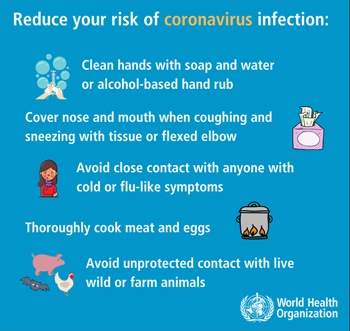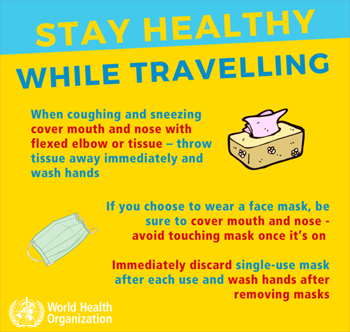World Health Organisation Statement on the meeting of the International Health Regulations (2005) Emergency Committee regarding the outbreak of novel coronavirus (2019-nCoV)
 On 23 January, representatives of the Ministry of Health of the People’s Republic of China, Japan, Thailand and the Republic of Korea updated the committee on the situation in their countries. There have been increased numbers of reported cases in China, with 557 confirmed as of today.
On 23 January, representatives of the Ministry of Health of the People’s Republic of China, Japan, Thailand and the Republic of Korea updated the committee on the situation in their countries. There have been increased numbers of reported cases in China, with 557 confirmed as of today.
Conclusions and Advice
On 22 January, the members of the Emergency Committee expressed divergent views on whether this event constitutes a PHEIC or not. At that time, the advice was that the event did not constitute a PHEIC, but the Committee members agreed on the urgency of the situation and suggested that the Committee should be reconvened in a matter of days to examine the situation further.
After the announcement of new containment measures in Wuhan on 22 January, the Director-General asked the Emergency Committee to reconvene on 23 January to study the information provided by Chinese authorities about the most recent epidemiological evolution and the risk-management measures taken.
Chinese authorities presented new epidemiological information that revealed an increase in the number of cases, of suspected cases, of affected provinces, and the proportion of deaths in currently reported cases of 4% (17 of 557). They reported fourth-generation cases in Wuhan and second-generation cases outside Wuhan, as well as some clusters outside Hubei province. They explained that strong containment measures (closure of public-transportation systems in Wuhan City, as well as other nearby cities). After this presentation, the EC was informed about the evolution in Japan, Republic of Korea, and Thailand, and that one new possible case had been identified in Singapore.
The Committee welcomed the efforts made by China to investigate and contain the current outbreak.
The following elements were considered as critical:
Human-to-human transmission is occurring and a preliminary R0 estimate of 1.4-2.5 was presented. Amplification has occurred in one health care facility. Of confirmed cases, 25% are reported to be severe. The source is still unknown (most likely an animal reservoir) and the extent of human-to-human transmission is still not clear.
Several members considered that it is still too early to declare a PHEIC, given its restrictive and binary nature.
Based on these divergent views, the EC formulates the following advice:
It is expected that further international exportation of cases may appear in any country. Thus, all countries should be prepared for containment, including active surveillance, early detection, isolation and case management, contact tracing and prevention of onward spread of 2019-nCoV infection, and to share full data with WHO.
Countries are required to share information with WHO according to the IHR.
Technical advice is available here
Countries should place particular emphasis on reducing human infection, prevention of secondary transmission and international spread and contributing to the international response though multi-sectoral communication and collaboration and active participation in increasing knowledge on the virus and the disease, as well as advancing research. Countries should also follow travel advice from WHO


You can read the full statement from WHO and get further advice and resources regarding this virus outbreak here
Source: WHO / Unionsafety


 On 23 January, representatives of the Ministry of Health of the People’s Republic of China, Japan, Thailand and the Republic of Korea updated the committee on the situation in their countries. There have been increased numbers of reported cases in China, with 557 confirmed as of today.
On 23 January, representatives of the Ministry of Health of the People’s Republic of China, Japan, Thailand and the Republic of Korea updated the committee on the situation in their countries. There have been increased numbers of reported cases in China, with 557 confirmed as of today.
